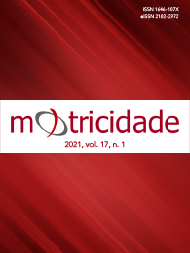Ansiedade no basquetebol universitário feminino
DOI:
https://doi.org/10.6063/motricidade.21074Resumen
A ansiedade pode influenciar significativamente o rendimento do atleta no jogo. O objetivo do trabalho foi analisar a ansiedade traço e estado referentes às situações competitivas e correlacionar com as variáveis de ansiedade e autoconfiança. Trinta e uma estudantes-atletas universitárias (21,61; DP= 2,72 anos) da modalidade de basquetebol responderam os questionários de caracterização da amostra, SCAT e CSAI-2 em 3 momentos de coleta (basal; pré-jogo e; pós-jogo). Os resultados: a) não mostraram diferenças estatisticamente significativas nos três momentos analisados na ansiedade traço, com correlações estatisticamente significativas com ansiedade cognitiva e autoconfiança (r= 0,389 e -0,414, respectivamente); b) na ansiedade estado somática, houve diferença estatisticamente significativa entre os níveis basais, pré-jogo e pós-jogo, com correlações estatisticamente significativas com ansiedade cognitiva (r= 0,313) e autoconfiança (r= -0,511); c) na ansiedade estado cognitiva, houve diferença estatisticamente significativa entre os níveis basais, pré-jogo e pós-jogo, com correlações estatisticamente significativas com autoconfiança (r= 0,289). Esta pesquisa, que avaliou a ansiedade em situações competitivas, possibilita identificar suas variações ao longo do tempo para fornecer dados importantes para a comissão técnica, melhorando assim as estratégias de intervenção no desempenho de atletas do esporte universitário.
Palavras-chave: Psicologia do Esporte, Ansiedade traço, Ansiedade estado, Basquete universitário feminino, Estudante-atleta.
Descargas
Publicado
Número
Sección
Licencia
The authors of submitted manuscripts must transfer the full copyright to Journal Motricidade / Sílabas Didáticas Editions. Granting copyright permission allows the publication and dissemination of the article in printed or electronic formats, and copyrights start at the moment the manuscript is accepted for publication. It also allows Journal Motricidade to use and commercialise the article in terms of licensing, lending or selling its content to indexation/abstracts databases and other entities.
According to the terms of the Creative Commons licence, authors may reproduce a reasonable number of copies for personal or professional purposes, but without any economic gain. SHERPA/RoMEO allows authors to post a final digital copy (post-printing version) of the article on their websites or on their institutions' scientific repository.


